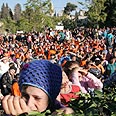
Gush Katif evacuees (archives)
צילום: דודי ועקנין
We’ll be back
Gush Katif residents will continue to dream of returning to Gaza
Today I returned to the Kissufim Crossing along with former Gush Katif residents, as well as many others who seek to remember and not to forget. Remember the glorious chapter in the State of Israel’s history, the pioneer spirit, the settlement enterprise, and the establishment of warm and supportive communities boasting national endurance in the Katif region.
Some people refer to the site as the “Kissufim checkpoint,” but in my view it’s the “Kissufim Crossing” and the distinction is not merely semantic, because the Kissufim Crossing has dual meaning.
On the one hand, it’s a geographic site, where in the past we saw the entry gates to Gush Katif; the same gates that were locked up four years ago following a puzzling decision lacking any logic or foresight. However, the word “Kissufim” in Hebrew means “longing,” and therefore it is also about my longing to Gush Katif, its brave and pioneering settlers, and everything they symbolized and still symbolize for me. I am unwilling to restrain this longing.
Yes, I’m unwilling to renounce the dream, aspiration, and objective of going back there. Returning and rebuilding the Gush Katif ruins. I know that some people think I’m delusional and tell me, by resorting to learned arguments, that this is impossible in rational terms.
Residents of Gush Etzion who were expelled from their land in 1948 upon the State’s establishment and Etzion Block’s downfall dreamed of returning for years, ever since the War of Independence. Their annual arrival to a nearby site seemed unrealistic at the time. Yet ultimately, the dreamers defeated the realists.
When the opportunity presented itself to resettle this region, the people were willing to accept the demand of the pioneers and backed the resumption of the settlement enterprise in Gush Etzion, which today is considered an inseparable part of the State of Israel. It enjoys consensus and wall-to-wall approval, including the endorsement of someone who to say the least is not a fan of the settlements: Former US President Jimmy Carter.
Four years have passed since the uprooting of Gush Katif, and the questions are still fresh in my mind. Do we truly “have love and it will prevail,” as the song says? Did it truly win? Or did it suffer a stinging defeat?
The answer is apparently somewhere in the middle. Love succeeded, but didn’t win. I, just like many others, believe that decisions back then were taken in a belligerent, immoral, and anti-democratic manner, yet at the end of the day the terrible and senseless move was carried out with the people of Israel’s backing, with the support of most of its elected representatives at the Knesset.
Jewish emissaries
If we wish to avert another expulsion in the future and thwart the uprooting of communities in other regions, we will have to do it first and foremost by loving and connecting. We will have to go to the people of Israel, explain to them, familiarize them, and entrench within them the moral, historical, and strategic importance of the pioneering settlement enterprise in Judea and Samaria. We will have to bring the people of Israel to visit and see things from up close and expose them to the various implications of the issue.We are not living in these regions as private individuals. We view ourselves as emissaries of generations of Jews. If we indeed view ourselves as the pioneers leading the camp, we must not, under any circumstances, disconnect from the people of Israel. If we do not disconnect from the people of Israel, there is a chance we will never again disengage from the Land of Israel.
It is possible that later too we will have to lead a determined struggle aimed at protecting the settlement enterprise. However, it will be a struggle premised on the principle we just noted, and the nature of this campaign will stem from this principle.
Therefore, on the one hand we will fight with determination against the intention, for example, to evacuate and raze outposts established by the Israeli government on state-owned land. On the other hand, the limits of our struggle will be derived from the fact we’re part of Israeli society; therefore, we will not hurt security forces, heaven forbid, and also refrain from targeting Arab property.
It took residents of Gush Etzion 19 years to go back home. Every year they made sure to remember, and didn’t forget. They reached the closest spot they could, and from there observed the region and passed on the hope of returning and rebuilding to the second and third generation.
The heroes of Gush Katif will be arriving at the Kissufim Crossing, and for the time being stop there physically. Yet their hearts, thoughts, dreams, and memories will ascend beyond the fences and gates, turning the Kissufim Checkpoint into a Crossing en route to returning to the Katif region.
It took residents of Gush Etzion 19 years to go back home. I hope Gush Katif residents will need less time.
Pinhas Wallerstein is the Yesha Council’s Director General










